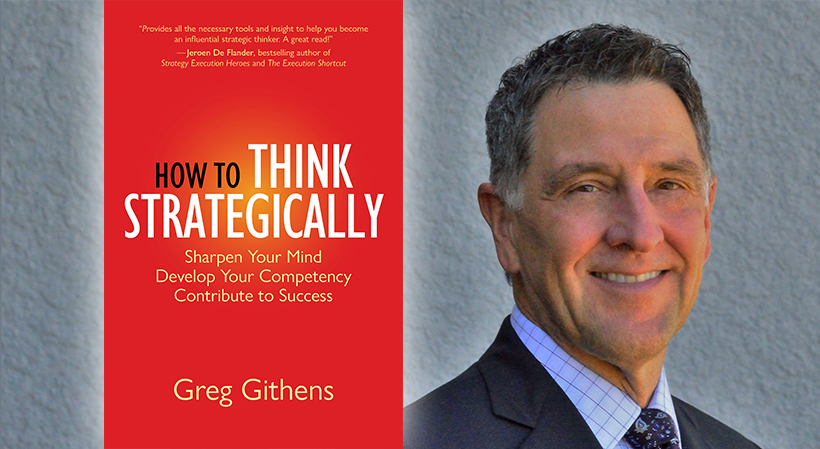Do some people simply possess an innate ability to think strategically, or can such a skill be developed over time? According to executive and leadership coach, Greg Githens, it’s the latter.
In Githens’ new book, “How to Think Strategically: Sharpen Your Mind, Develop Your Competency, Contribute to Success,” he shares practical advice on sparking strategic insights and identifying blind spots. We caught up with Githens to discuss why strategic thinking matters to entrepreneurs and how they can cultivate this important skill.
The following conversation has been edited for clarity and brevity.
StartupNation: How do you define strategic thinking?
Greg Githens: I break it into four pillars. Pillar one is about the individual. Pillar two is about using your mind. Pillar three is about arranging resources, and pillar four is an orientation toward success in the future.
To bring it all together, strategic thinking is an individuals’ capability to use their mind to arrange resources in order to be successful in the future.
It’s using your mind to create strategy. The strategy produced can be further characterized as being good, powerful, clever, effective or nuanced, as opposed to bad, weak, stupid or generic.
StartupNation: What are some scenarios in which entrepreneurs need to apply strategic thinking?
Greg Githens: A business idea is a good place to start. If they’re doing it well, they’re scanning the environment, seeing what’s going on out there and what kind of opportunities are available. They’re thinking about what they want to do, and recognizing that maybe other people have similar ideas.
Competition is always going to react to a new entrant, so there’s a strong need for entrepreneurs to have good strategic thinking. That means they are aware that sometimes we come up with what we think are great business ideas, but they’re really not very good business ideas. It’s just something we got excited about for a while.
Related: Sharpening Your Strategic Focus: How to Take Your Startup to the Next Level
StartupNation: What happens if they haven’t developed strategic thinking skills?
Greg Githens: One classic example is restaurants. More restaurants are started up in this country than any other small business, and more restaurants fail than any other small business. Yet, year after year after, year people start up new restaurants. They tend to ignore statistics. They’re saying, “Well, I’m better than that.” Or ,“That doesn’t apply to me.” One of the things that a strategic thinker wants to do is to recognize that our minds often trick ourselves. That sometimes leads to bad decisions.
One of the interesting things for entrepreneurs is that the big companies that they’re competing with have managers who have the same cognitive biases. These big companies are also neglecting opportunities. That creates a tremendous opportunity for entrepreneurs if they can see a small signal that the big guys aren’t paying attention to. That’s where a lot of really great companies have gotten started.
Even though it was in the wheelhouse of one of the big companies, the big companies just ignore all that. If you look at the ongoing dynamics and the economy, there’s probably a strong case to be made that the great companies of the future are the ones that are being founded right now, and if you are a big, established, incumbent firm you’ve got to watch out for complacency.
StartupNation: Could you give us a few tips on developing this line of thinking?
Greg Githens: A consistent theme through my book is that there are 20 micro-skills of strategic thinking. I call this the Ben Franklin Technique. I encourage people to take one micro-skill a week and just focus on that micro-skill for the entire week. Even if you only spend five minutes a day or five minutes a week, that’s better than nothing.
An example of a micro-skill is curiosity. For the week in which curiosity is your micro-skill, look for every opportunity to be curious in your conversations, to be curious in your day-to-day goings on, get out of your comfort zone and learn. The next week: ambition. That asks you to think about the impact that you’re making on your organization and on the world around you. The Ben Franklin Technique goes all the way back to an idea that founding father Ben Franklin had. He had a technique where he would just focus on one virtue per week.
Sign Up: Receive the StartupNation newsletter!
StartupNation: Is there anything else that you’d like readers to know about you, your book or your work in general?
Greg Githens: I hope this (book) is something that positively changes people’s lives. People are talking about the need for having leadership in culture, innovation and collaboration. The argument I would make is that everybody in an organization should be thinking strategically. This is not something that belongs exclusively to people at the top of the organization.
Everybody should pay attention to weak signals. It’s a process of sensing what’s going on, trying to make sense of that, and then marshaling your resources so that you can get some sort of advantage. I believe this can do a lot of positive things for people in their careers. Through (this process), then they can magnify their own efforts toward making society better.
“How to Think Strategically: Sharpen Your Mind, Develop Your Competency, Contribute to Success,” is available now wherever books are sold and can be purchased via StartupNation.com.





